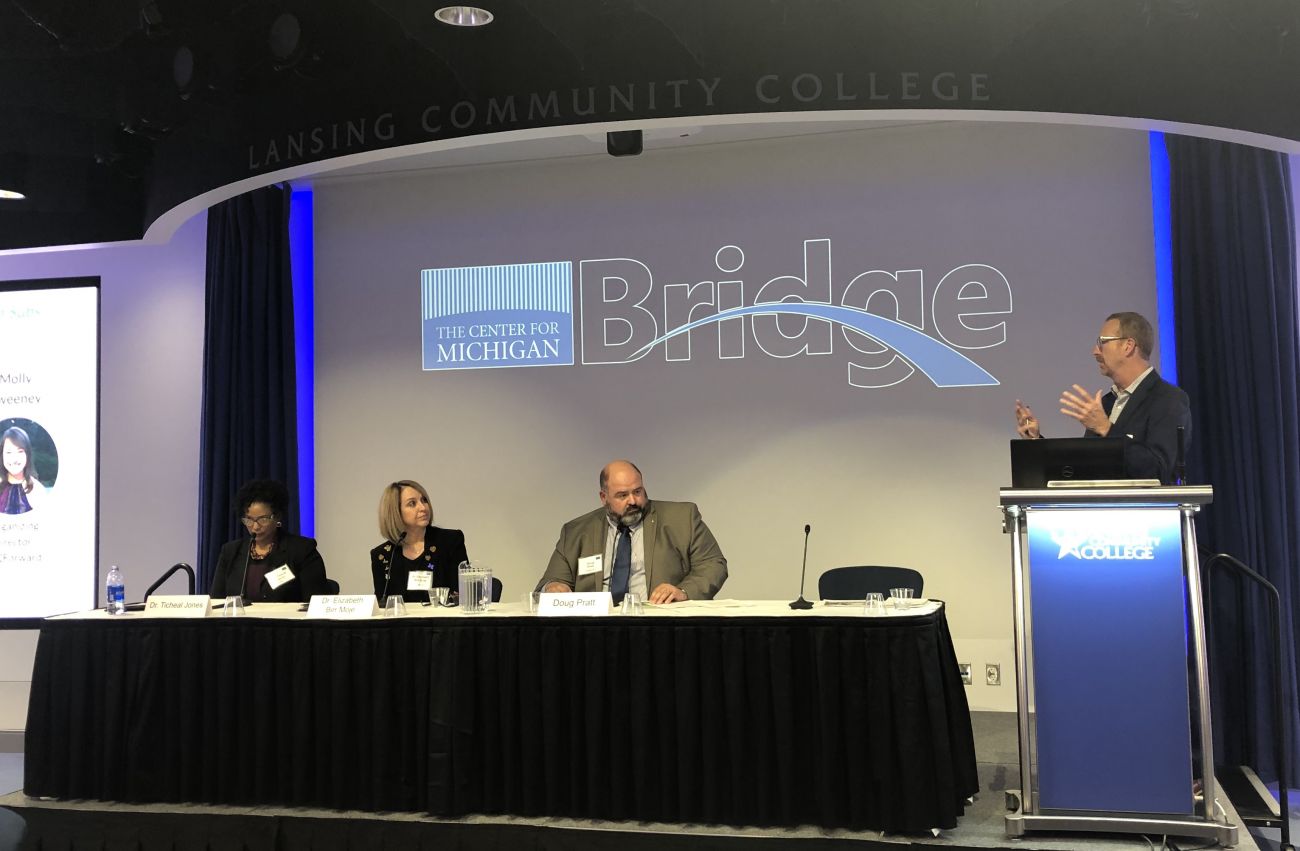Experts: Pay teachers more to curb Michigan’s long-term substitute ‘crisis’

LANSING — Michigan will face an education crisis that will harm children if policymakers don’t address a teacher shortage that has sparked an explosion in untrained substitutes leading classrooms.
That was the conclusion of a panel of experts who spoke Thursday at a summit sponsored by Bridge Magazine and its parent company, The Center for Michigan, at Lansing Community College.
More than 2,500 Michigan classrooms were led by long-term substitutes who weren’t certified during the 2018-19 school year, a tenfold increase in five years, according to a Bridge Magazine analysis published in August.
Low-income and academically struggling students are most likely to be taught by the instructors, who aren’t required to have a four-year degree or any teacher training, according to Bridge’s analysis. That’s because of a policy meant to fill classroom vacancies that allows those with as few as 60 college credits in any subject to teach a class for a full year.
“That is verging on a crisis,” said Elizabeth Birr Moje, dean of the University of Michigan’s School of Education. “We know that great instruction matters, and we know that teachers who are not prepared are not providing great instruction.”
Moje and other experts called the long-term sub trend a symptom of institutional problems that have underpaid teachers and left them with fewer classroom resources, diminished respect and looking for another career.
Higher pay and more classroom funding would attract teachers to Michigan, several panelists said. But changing rhetoric about the profession is important too, some argued. That could include touting the profession as a vehicle for social change and justice — as well as toning down rhetoric focusing solely on teacher accountability.
“Let’s stop talking about teachers as if they’re idiots,” said Moje, adding that her school is trying to tell positive stories about teaching.

Bridge articles on long-term substitutes:
- Michigan leans on long-term substitutes as its schools struggle
- Expert: Michigan’s reliance on long-term subs should ‘concern all of us’
- How a wedding planner became an uncertified Michigan teacher for $15 an hour
- Alarmed by long-term subs, Detroit raised teacher pay and offered bonuses
- Michigan school leaders decry explosion of untrained teachers in classrooms
Enrollment at Michigan’s teacher preparation programs dropped 70 percent in eight years, according to federal data. Average teacher pay in Michigan was lower in 2017-18 ($61,908) than in 2009-10 ($63,024) — even without taking inflation into account. Nationally, teaching pays 20 percent less than the earnings of professionals with comparable education backgrounds.
Even so, Michigan teachers still earn $2,200 a year above the national average, in a state with the seventh-lowest cost of living.
“It’s about salaries, it’s about training, it’s about class size,” said Nikolai Vitti, superintendent of Detroit Community Schools. “We’re disinvesting in public education and teachers are feeling that.”
Over the past two years, Vitti has boosted teacher pay, offered bonuses and changed hiring practices to dramatically shrink vacancies within his district.
Panelists on Thursday also said Michigan could offer grants to would-be teachers to defray the cost of education.
Robert Kimball, Grand Valley State University's associate vice president for charter schools, said his schools are trying to incentivize long-term substitutes to become fully trained by offering them acceleration programs.
As Michigan tackles its teacher shortage, policymakers should also value diversity in recruitment, some experts said. The state has an overwhelmingly white teaching force, meaning students in many classrooms are less likely to find mentors that match their racial and socioeconomic backgrounds. That’s a problem — particularly as research shows black students are more likely to succeed in classrooms led by black teachers, said Dorinda Carter Andrews, chairwoman and professor of Michigan State University’s Department of Teacher Education.
“Nobody wants to talk about the racial nature of the problem,” she said. “[Teacher shortages are] happening in communities where people don’t pay attention.”
See what new members are saying about why they donated to Bridge Michigan:
- “In order for this information to be accurate and unbiased it must be underwritten by its readers, not by special interests.” - Larry S.
- “Not many other media sources report on the topics Bridge does.” - Susan B.
- “Your journalism is outstanding and rare these days.” - Mark S.
If you want to ensure the future of nonpartisan, nonprofit Michigan journalism, please become a member today. You, too, will be asked why you donated and maybe we'll feature your quote next time!

